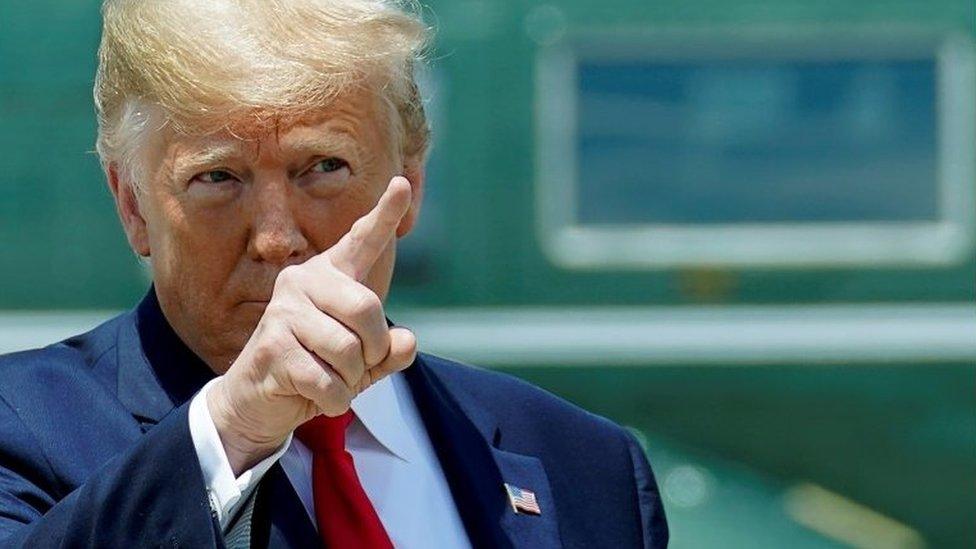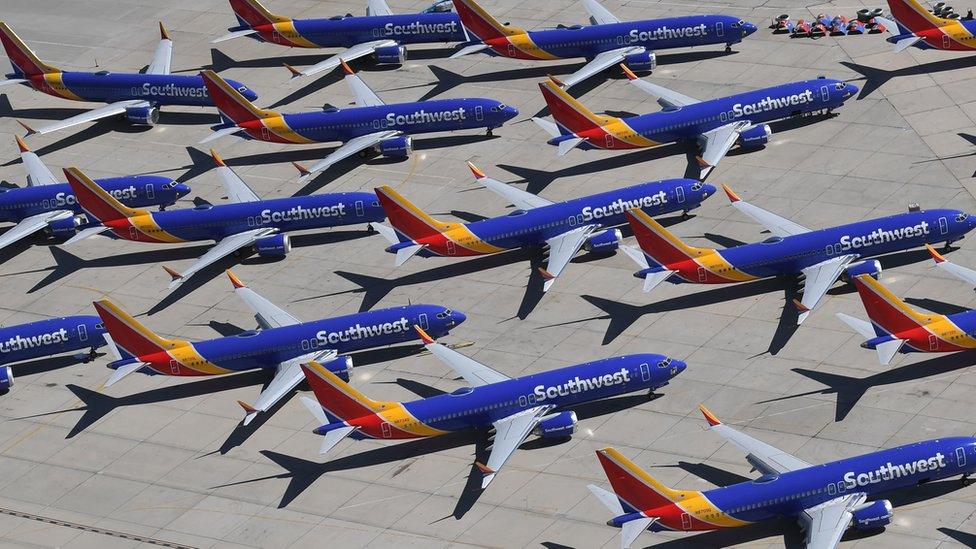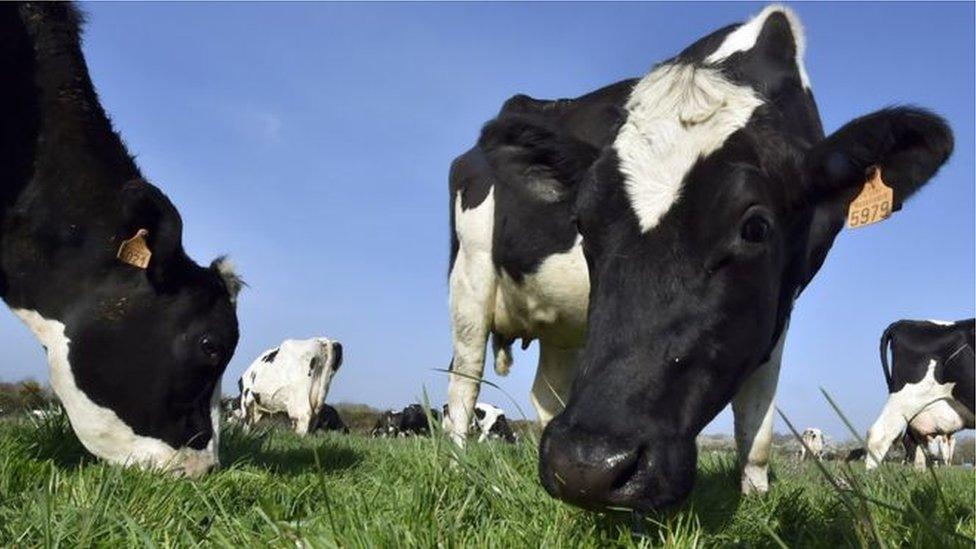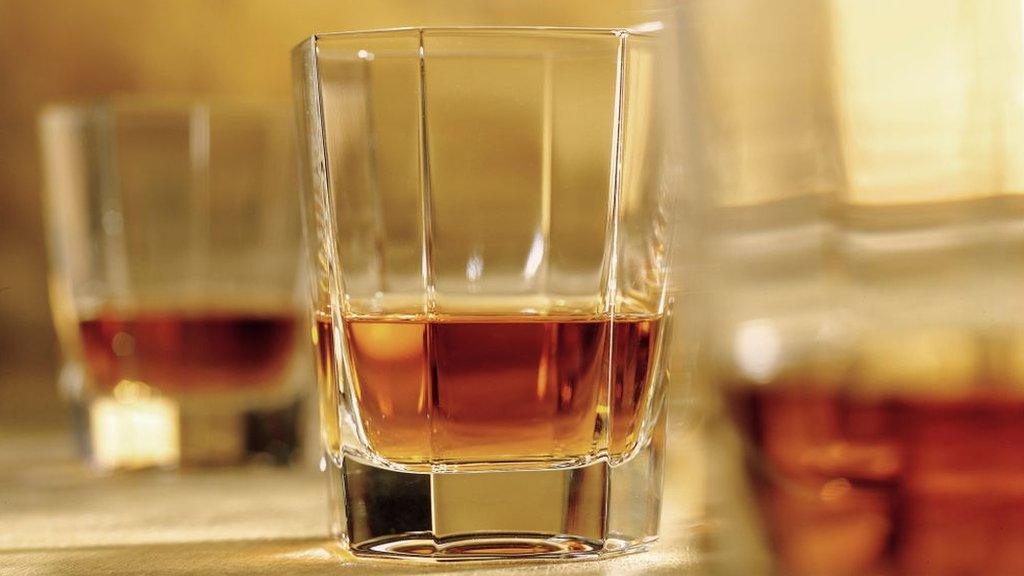Scotch in Trump's trade crosshairs
- Published

Scotch whisky has been drawn into US-European trade battles. It was bound to be so, as the uses and abuses of tariffs are Donald Trump's signature foreign policy.
It is Americans that pay the price of imposing tariffs on imports into the USA. Even if it looks helpful to enjoy protection, US industry is not enthusiastic about the effects and the retaliation.
Elsewhere, trade barriers are coming down. The EU has struck deals which will see tariffs fall. But outside the EU, that wont' apply to Scotch whisky - until the UK concludes its own deals, starting from a relatively weak position.
It should be no surprise that Scotch whisky has joined the long list of European Union exports being considered for punitive tariffs by the Trump administration.
Tariffs have become the president's signature foreign policy, probably because trade involves commerce and deals, at which he claims to be expert.
It also plays well to his political base, which has been fed a diet of "Buy American" propaganda, long before Donald Trump entered politics.
Scotch is such an obvious example of a globally-recognised and traded good, with which others struggle to compete. If trade has become the focus of foreign policy, the humble dram could hardly avoid being drawn in.
Cashmere sweaters
The dispute over Airbus and Boeing subsidies goes back 14 years, so this cannot all be pinned on Donald Trump.
Perhaps for that reason, it remains a dispute within the machinery of the World Trade Organisation. Trump's trade wars have been fought on a bilateral basis, using America's clout to push China, South Korea, Mexico and Canada into line with American interests. Next comes the EU, with the presidential sights set on German cars.
Tariffs are being used to pursue non-economic objectives. The threat to introduce punitive taxes on Mexican imports of food into the USA was to force its government to do more to curb the flow of migrants up to the US border.

President Trump has his eye on further trade tariffs
Using tariffs that way, Donald Trump can turn the taps on and off, leaving Congress playing catch-up, while his moves dominate the news cycle. He can sabre-rattle and threaten, and he can as easily back off, claiming to have won concessions, even where they are hard to find.
So while the introduction of tariffs on Scotch exports to the USA remain in the sabre-rattling category, and nothing is imminent, we can expect more of this to come. And note that the initial list of goods that could be targeted by Washington included cashmere sweaters and salmon - both significant exports from Scotland.
Retaliation
A couple of unusual facets of this new trade war terrain are worth noting. One is that the consumers and the businesses that pay the main price for America's tariffs are American ones. Higher tariffs paid at ports mean both lower demand for those imports, but also higher prices for those who continue to choose or need to use those imports.
And few industries welcome new barriers to trade. The easy political message is that tariffs can help protect a domestic producer, and build up its strength. So you might think that American steel-makers would welcome tariffs.
Over time, that may be true. But the producer operating behind protectionist walls is likely to be less efficient, more expensive to domestic consumers, and less able to compete overseas if and when the walls are dismantled. (Britain's military shipbuilders spring to mind.)

The dispute over Airbus and Boeing subsidies goes back 14 years
American industry is not that supportive of the Trump regime. If steel prices go up, that hits the more numerous companies that use steel to make their end products.
Even Boeing, which wants to see Airbus subsidies cut back, does not seem to be keen on the breadth of the trade attack now being planned by the US Trade Representative.
And US distillers are not supportive of trade barriers being introduced, because they know that retaliatory measures are likely to come their way.
Auchentoshan
In any case, a highly international distilling business has companies that cross the Atlantic. Diageo is the biggest exporter of Scotch whisky, but it is also a big importer of it, and an exporter of US spirits.
Jim Beam, the Kentucky straight bourbon, sounds as American as it gets. It is part of Beam Suntory, headquartered in Chicago. But its interests are across Scotch brands Laphroaig, Bowmore, Auchentoshan, Ardmore and Teachers. It owns Suntory in Japan, Canadian Club and Courvoisier cognac.
And there are the casks. As the Scotch Whisky Association pointed out in response to the threat of US tariffs, its members spend £70m per year buying and importing bourbon wooden casks, in which Scotch is matured, giving it much of its taste, colour and character.
Brazilian
The other notable part of this trade story is that, away from Donald Trump's America, tariffs are coming down. In the past few days, at the G20 summit and with the Juncker administration soon to relinquish its grip on Brussels power, the European Union finalised deals with Vietnam and Mercosur.
The latter is a trading bloc of Brazil, Argentina, Paraguay and Uruguay. A wide-ranging trade deal includes a pledge to reduce tariffs from whisky, which currently range from 20% to 35%. Over time, they are due to fall to zero, which is where American tariffs on whisky have been for 20 years.

Farm produce will be high on the agenda
In exchange, the EU has had to make concessions on trade that is important from a South American perspective. Foremost among them are farm produce. And there's a problem there. French farmers don't like the look of lower-cost produce entering the EU market on improved terms. The EU agriculture commissioner, Phil Hogan, has reassured them that there will be quotas, change will be gradual, regulatory standards will be respected, and the market won't be swamped. But there could be a fight to get the deal ratified.
The Vietnam trade deal should prove less of a challenge. It charges a tariff of at least 45% on Scotch whisky, and that is scheduled to reduce to zero over seven years.
Disadvantage
But you'll note that there's a catch for the Scotch whisky industry. In a few months, let alone seven years, the UK is on course to be out of the European Union. Once out, it will not get the benefit of these reduced tariffs agreed by the EU.
One of the arguments made for Brexit is that the Westminster government can go out to the world with a new global strategy, and strike trade deals that are better suited to UK exporters' interests.
Maybe so. But what we should know by now is that such deals are complex and take time. And, at least initially, the UK's need to get deals done means that it starts with a negotiating disadvantage.
That's quite apart from the long-term problem of having a smaller domestic market than the EU, and therefore less with which to negotiate.
Post-Brexit, the UK may be able to negotiate deals which would see whisky tariffs reduced to zero. But it would surely require compromise elsewhere, on the priorities of those trading partners on the other side of the negotiating table. In India, for instance, that starts with work visas.
Until Britain can get those trade deals signed, Scotch whisky will be operating at a disadvantage, facing tariffs of as much as 45% - whereas, for instance, Irish whiskey distillers can look forward to no tariff at all.
If you were running an Irish distillery, you would probably use the opportunity to grow your share of those fast-growing export markets in South America and Asia.
- Published2 July 2019

